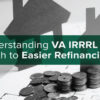
Your homes are more than four walls you live in. They are one of the most valuable assets for homeowners. When you have paid a notable chunk of your mortgage, your equity in the house grows, and you can use it for your needs like renovating your house, education loans, consolidating debt, or medical expenses. Want to know how?
One of the best ways of leveraging this equity is an FHA cash-out refinance that lets you switch your current mortgage for a new one with a larger sum. The amount of the new mortgage depends on your current equity in the home, how much you owe on your current loan, and the extra funds you need.
If you plan to access your home equity for other crucial expenses, this blog will cover everything you need to know. We’ll walk you through how FHA cash-out refinance works, its benefits and drawbacks, and eligibility requirements.
How Does an FHA Cash-Out Refinance Work?
The FHA cash-out refinance works like any other cash-out refinance. You can understand it with the help of a simple example below:
Let us assume that you currently owe $200,000 on your current mortgage, and an appraisal shows that your home is $400,000. Now, you have decided to refinance your mortgage with an FHA cash-out refinance as it is backed by the Federal Housing Administration (FHA).
With a FHA cash-out refinance, you can borrow $320,000, 80% of your home value. Once your loan is approved, $200,000 will be used to repay your existing mortgage, and you will get $120,000. As a result, you will have new monthly payments on your new mortgage of $320,000. The extra amount can be used for other expenses like home improvements, high-debt loans, and other purposes.
However, you need to take into account closing costs here as it will deduct your lump sum cash by that value.
Advantages of an FHA Cash-Out Refinance
While FHA cash-out refinances are known to provide access to your home equity, there are other benefits that you cannot ignore. Take a look at some of the top advantages of FHA cash-out refinance for homeowners:
1. Lower Interest Rates
FHA cash-out refinances generally offer competitive interest rates. These are generally 10-15 base points lower than other cash-out refinancing options. As a result, you can borrow the money for less and pay off high-interest-rate debts at slightly more favorable rates.
2. Better Accessibility
The FHA cash-out refinance is not restricted to users who have existing FHA loans. Thus, borrowers with various types of mortgages, such as conventional loans, VA (Veterans Affairs) loans, or USDA (United States Department of Agriculture) loans, are also eligible to apply for these mortgage products.
3. Lower Credit Score
The credit score requirements for an FHA loan are lower than for conventional loans. However, that also means that a low credit score can lead to a higher rate of interest at times.
Disadvantages of an FHA Cash-Out Refinance
Just like everything else, an FHA cash-out refinance is not free from drawbacks. Let us take a look at some of the disadvantages that prevent borrowers from choosing the option:
1. Increased Debt Load
When you choose a FHA cash-out refinance loan, you are practically taking a new loan where you will owe more than you do now. Consider our earlier example where you take a loan for $320,000 while you currently owe $200,000. In this case, the difference between the two is the additional debt load you are taking on yourself.
2. Mortgage Insurance
All FHA loans require mortgage insurance that you must cover. You can pay these costs upfront when you take out your loan or roll it into your monthly payments. All of this adds extra cost to your loans, making them expensive.
By understanding its benefits and drawbacks, one thing is clear: you must carefully evaluate your financial situation, consider the associated costs, and have a clear plan for using the cash before proceeding with this mortgage refinance option.
Eligibility for an FHA Cash-Out Refinance
Have you finally decided to take the plunge and apply for an FHA cash-out refinance? Well, not everyone can qualify for an FHA cash-out refinance so easily. You must meet the following criteria if you want to get your loan approved:
1. Credit Score
According to the FHA guidelines, you need a credit score of a minimum of 580 for an FHA cash-out refinance. Some lenders might require you to have a score in the range of 600-620 to be able to get the loan.
2. Primary Residence
The home on which you want to get an FHA cash-out refinance must be your primary residence. The FHA requires that you live in the home for at least 12 months before applying for the mortgage loan. Most lenders will require your employment documentation and utility bills as proof of residency.
3. Timely Mortgage Payments
Another essential factor for qualifying for an FHA cash-out refinance is that you must have paid your existing mortgage on time. This means you cannot have any late payments within the past 12 months.
4. Loan-to-Value Ratio
An LTV ratio shows the equity you have built in your home. An FHA cash-out refinance requires that the amount you owe on your current mortgage is not greater than 80% of the home value.
5. Debt-to-Income Ratio
There are two DTI ratios that lenders consider when refinancing a mortgage. First is the front-end DTI, the pretax income that goes into housing payments. Second, the back-end DTI ratio, which is the total DTI ratio, including all debts and housing payments.
If your credit score is less than 580, you will need a front-end DTI ratio of less than 31% and a back-end DTI ratio of less than 43%. However, if your score exceeds 580, you can have a front-end DTI ratio of 37% and a back-end DTI ratio of 47%.
Note: The exact guidelines may vary from lender. Speak to your lender and check the eligibility requirements. However, you should still meet the minimum standards set by the FHA.
Conclusion
An FHA cash-out refinance can be a wise choice if you plan to refinance your existing mortgage. It can help you access your home’s equity to fund important expenses, reduce high-interest debt, or improve your property. However, it’s crucial to evaluate your financial situation, eligibility, and long-term plans carefully.
Before proceeding with an FHA cash-out refinance, consult with the mortgage professionals at Bond Street Mortgage. They can provide adequate guidance to ensure that an FHA cash-out refinance provides you with benefits and aligns with your overall financial strategy. Contact us today and get all the details about FHA loans.












